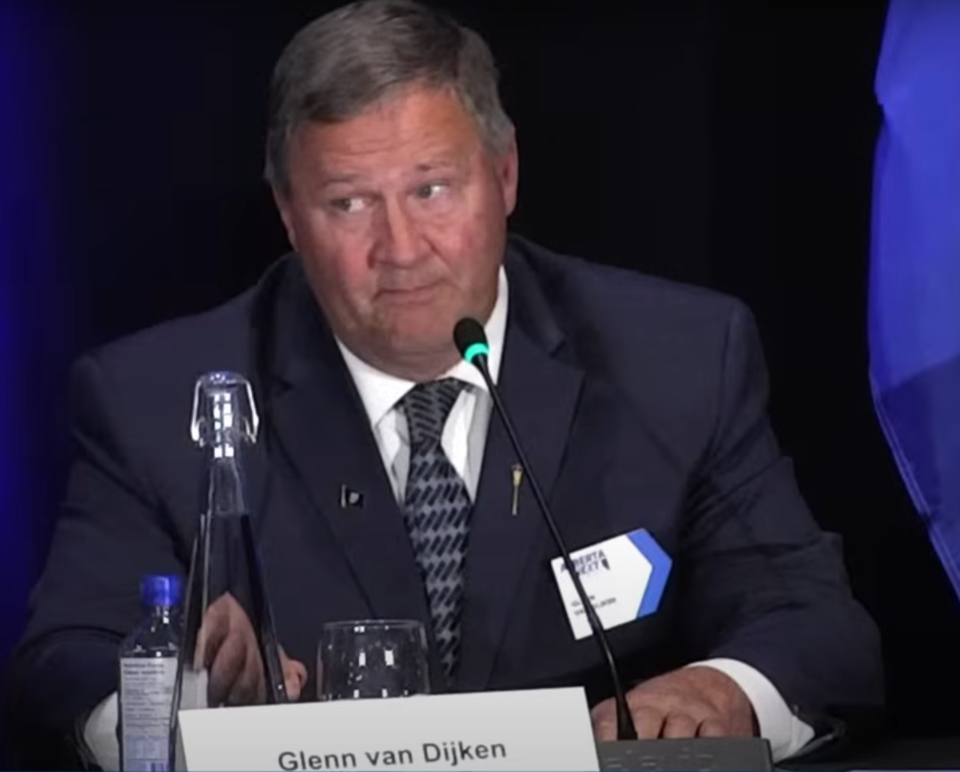A series of provincial town halls being conducted by a panel of UCP representatives, community figures, and policy experts got a mixed reception in Edmonton after receiving warmer welcomes in Red Deer and Sherwood Park.
With a set goal of “exploring ideas and policies to assert our sovereignty and constitutional rights within a united Canada,” the panel has been a political lightning rod at a time when Alberta’s future within Canada is up for debate.
“You definitely don’t get everyone agreeing on everything, but that’s just the reality of the discussion,” said Athabasca-Barrhead-Westlock MLA Glenn van Dijken, one of five UCP MLAs on the 16-person panel.
“I believe it’s useful to help Albertans and give them an opportunity to bring their voice to a town hall meeting like that; I’m happy with how the process is going.”
Part of van Dijken’s goal for the panel is to advance a series of conversations he said have been happening for almost three decades around Alberta’s role within Canada and the province’s relationship with Ottawa and the federal government.
Plans to increase Alberta’s usage of its constitutional powers aren’t new: the 2001 Alberta Agenda, a letter penned by seven Albertan conservatives including future prime minister Stephen Harper, called for a provincial police force, withdrawal from the Canada Pension Plan, and changes to how Alberta deals with the collection of the provincial income tax.
“The items that we’re highlighting in each of the town halls – the police force, the pension plan, the taxation, equalization formulas – that’s been something that’s been an ongoing discussion,” said van Dijken.
A common comparison used during the town halls – van Dijken brought it up himself during the Edmonton stop – is Quebec. Not only does the province have its own police force and pension plan, it also collects taxes and manages over half of their immigration file.
“There’s a slant out there that would argue that the town halls are fuelling the separation discussion; I don’t believe that at all. When I spoke, I talked about how these are authorities over areas that we are already entitled to under the current Constitution,” said van Dijken.
“It doesn’t equate to separation; it equates to sovereignty within Canada.”
While the UCP have drawn critique for the panel, and its timing, van Dijken said he thought it fit in well with the discussions going on federally. As he pointed out, the previous Liberal government under Prime Minister Justin Trudeau hadn’t done a great job of working with Alberta, and it’s still to be seen whether Prime Minister Mark Carney will do a better job.
“The federal government is talking a good talk, but now they need to start walking the walk, and when we talk about the Canada issue, that’s why it’s important to do it now. We need to see that the leadership in Ottawa is going to take the concerns of each region of the country seriously,” said van Dijken.
“I believe that this conversation is necessary. I don’t believe that sweeping it under the rug and trying to think that it’s not there is healthy. I believe that it's necessary in our relationship with other provinces, with the federal government, that we’re being open and honest with some of the concerns we have with confederation at this time.”
As the panel moves towards a series of stops in Alberta’s rural regions – panellists will be in Fort McMurray Aug. 26 and Lloydminster Aug. 27 before kicking off more town halls in September – van Dijken said he was expecting the Edmonton stop to be a one-off, at least until they go back to the larger cities.
“I’ve read some of the reports on how raucous the group was (in Edmonton), but I didn’t feel it was threatening at all. It was just quite emotional. The one thing I would say is that emotions are high,” said van Dijken.
“Whether or not we see that in other areas, it’s hard to know.”



